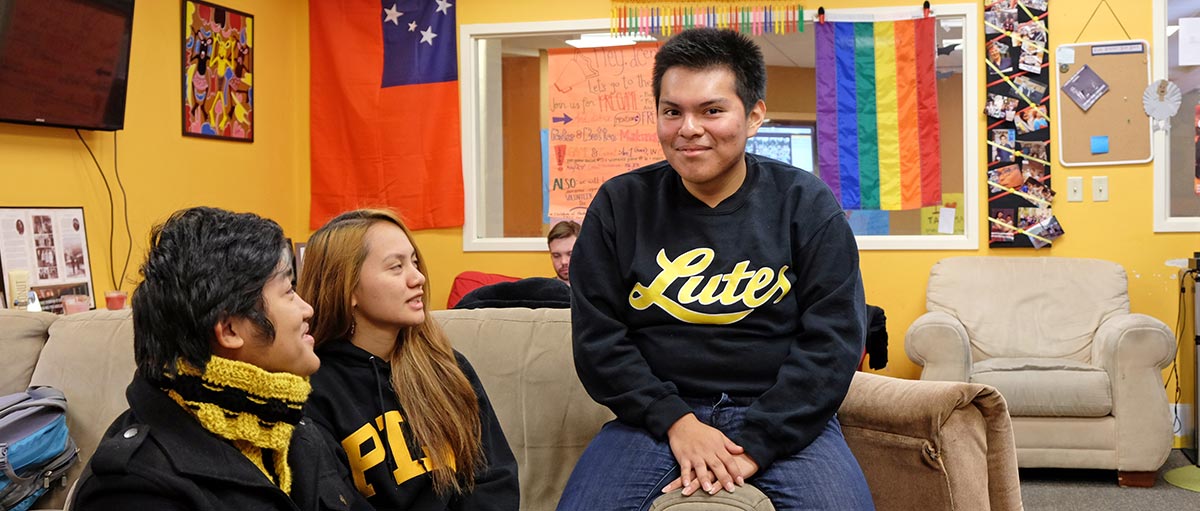PLU Summer Academy: First-year students spend five weeks earning six credits, making new friends and adjusting to life on campus

Image: “Summer Academy really helped me find my passion and dive into it,” -Eduardo Torres ’19 (Photo by John Froschauer/PLU)
By Zach Powers '10
PLU Marketing & Communications
TACOMA, WASH. (March. 16, 2016)- Charles Reinmuth ’19 didn’t think twice when he was offered the chance to spend five weeks in the summer getting acclimated to life at Pacific Lutheran University and earning his first six college credits for free.
“I couldn’t pass up the opportunity,” Reinmuth said. “I was already excited to go to PLU, why wouldn’t I want to go earlier?”
Eduardo Torres ’19 felt the same.
“I was so stoked,” Torres said. “I was getting a month of college before anybody else.”
Reinmuth and Torres were two of 17 students selected for the inaugural class of Summer Academy, an extensive residential program designed to further prepare first-year students to successfully navigate their transition from high school to college. The program provides incoming first-year students the opportunity to earn six credits at no cost while focusing on skills paramount to thriving in college: reading, writing, critical thinking, dialogue and discussion.
Thanks to Summer Academy, Reinmuth – a music education major from Vancouver, Washington – said that he felt calm and comfortable by the time he returned to campus more than a month later for fall semester.
“I was able to help people moving in with some of their questions and have some experience behind what I was saying,” Reinmuth said.
Organized by the Office of the Provost in collaboration with a faculty task force and the Department of Residential Life, Summer Academy was inspired by research that demonstrates that first-generation and other non-traditional students benefit substantially from ongoing community support to help navigate the expectations of college.
“There are incoming students that have a lot of potential and a lot of desire and interest to do well in college, but are facing obstacles that might prevent them from doing as well at PLU as they could,” said Assistant Professor of Mathematics Ksenija Simic-Muller, who taught a Summer Academy course. “What summer academy tries to do is address (those obstacles) early on by providing more support to these students.”
Assistant Professor of Sociology Galen Ciscell, another Summer Academy instructor, strongly endorses the new program.
“Students who go through the Summer Academy program are going to have a real leg up,” Ciscell said. “They will already have a connection with this university that is going to anchor them and keep them here for all four years.”
Summer Academy requires all participants to enroll in a class called University as Text (Global Studies 287) and choose between Sociology of Education (Sociology 287) or Mathematical Explorations (Math 107).
Reinmuth said he knew very little about sociology when he registered for Sociology of Education, which included a collaborative project with nearby Keithley Middle School, but he’s thankful he did.
“Sociology actually became one of my favorite classes and I’m now really good friends with the professor,” he said.
University as Text included visits to parts of Tacoma that many students don’t often encounter as first-years, if at all. Torres said his favorite excursion was a transit tour of downtown Tacoma led by alumnus Andrew Austin ’06. For Reinmuth, a trip to the Tacoma Public Library stood out.
“It ended up being a really neat experience.” Reinmuth said. “We went through some really old archives that the library had and I actually ended up taking one of my friends back there during my first semester.”
Two of the core objectives of Summer Academy include building a strong community of support around incoming students and ensuring students know how to access the many supportive resources offered by the university.
Ciscell pointed to research that suggests achieving these objectives can be paramount to a student’s long-term collegiate success.
“We know that one of the biggest retention factors for students is whether they make a connection on campus, be it with a club, student organization or faculty or staff member,” Ciscell said. “This research suggests that the transition to college is best supported by the building of confidence, creation of community, and access to strategies and resources.”
Summer Academy also provides an opportunity for participants to grow accustomed to life in a residence hall, as the students all stay in Hong Hall.
“It’s a great way to build friendships,” said Torres, a sociology and French double major who graduated from Kent High School and grew up in Burbank, California. “It gave me great perspective about what to expect from a roommate.”
Reinmuth also appreciated his time in Hong Hall. “My roommate from Summer Academy is now my best friend today,” Reinmuth said.
Both Reinmuth and Torres said they’d strongly recommend Summer Academy to any incoming students who receive an invitation to attend.
“Summer Academy really helped me find my passion and dive into it,” said Torres.
Reinmuth said he feels more prepared: “It sets you on track so that when you arrive at college (in the fall) you don’t feel like a stranger,” he said. “You feel like you’re already at home because you attended Summer Academy.”


